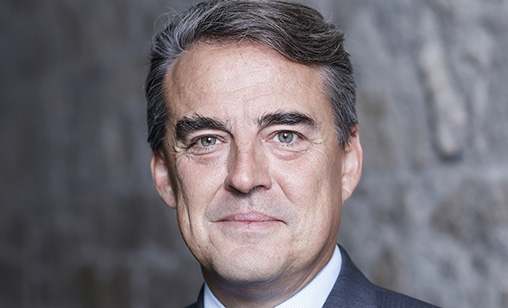News Backgrounder
IATA’s de Juniac defends airlines’ overbooking policy
May 1st 2017
Last month’s video of a paying passenger being dragged from an overbooked United Airlines flight shocked viewers worldwide, but it should not be used as an excuse to stop carriers overbooking flights, the International Air Transport Association (IATA) said in a statement issued after the ugly incident. Read More »
Airlines should be allowed to continue long-established overbooking practices, IATA said. “The business is unique. Once a flight takes off the seats on that flight are no longer available for sale. It’s a time-sensitive, perishable product,” the association said.
 |
“Airlines have sophisticated systems that tell them that on any given flight on any given day a specific number of passengers may not show up. They book seats in excess of the available capacity to protect against the aircraft departing with empty seats.”
Some governments are considering regulations to restrict overbooking, but IATA said it is an economically important activity that should not be denied to the carriers. If the practice is stopped then consumers might lose access to more flexible fares, it added.
IATA director general, Alexandre de Juniac, wrote in his latest blog that everybody who watched the video of the passenger being dragged off UA flight 3411 was shocked. “That includes me. Whatever the reason, what happened was clearly unacceptable. And United has recognized that,” he said.
“My job is not to be an apologist for a truly regrettable situation. Nor is it to be a judge or arbiter between airlines and their passengers. But I do have the responsibility to defend the reputation of an industry that I am proud to call the business of freedom.”
Each day, he said, some 10 million passengers board planes for 100,000 flights that will take them safely to their destinations. “That is no less than a modern day marvel of technology, coordination and dedication to safety. The 63 million people employed in making travel possible are human. Sometimes they make mistakes. In a service business amends need to be made swiftly and with the human touch.
“But the response must be more thoughtful than headlines painting an entire industry with the hue of a single and very regrettable incident.”
De Juniac said questions have been raised about passenger rights, procedures for denying boarding to passengers, the actions of local law enforcement and overbooking practices.
“At the risk of sounding old-fashioned, the best results will not come out of angry, knee-jerk responses that seek resolution in 140 characters or a newspaper comment piece written before the entire incident has revealed itself,” he said.
“Where do we go from here? United has pledged to take immediate concrete action to ensure this never happens again and has announced a thorough review of its relevant policies and actions in oversold situations. If there is something in this incident that requires changes at an industry level the next step is a robust dialogue,” he said.
In the meantime, the chief executive of United, Oscar Munoz, announced he was planning a trip to China following the incident. The passenger involved was Dr David Dao, a U.S. citizen and a Vietnamese refugee who is a practicing physician in Kentucky.
His treatment angered many in the Asian community and triggered calls for a boycott of the airline by Asian groups in the U.S., Vietnam and China. Munoz visited the Chinese consulate in Chicago to smooth over the situation amid concerns the treatment of Dr. Dao would affect bookings from Chinese customers. United holds 20% of US-China air traffic and is in partnership with China’s flag carrier, Air China.
| Paying your way out of trouble Atlanta-headquartered Delta Airlines has given airport employees permission to offer passengers almost $10,000 in compensation for giving up their seats on overbooked flights. Delta made it’s decision as rival, United Airlines, struggles to recover from images of a passenger’s forced removal from a sold-out Chicago to Kentucky flight last month. In an internal memo obtained by The Associated Press, Delta said gate agents could offer up to $2,000 in compensation compared with the previous maximum of $800, and supervisors could increase their highest offer from $1,350 to $9,950. |